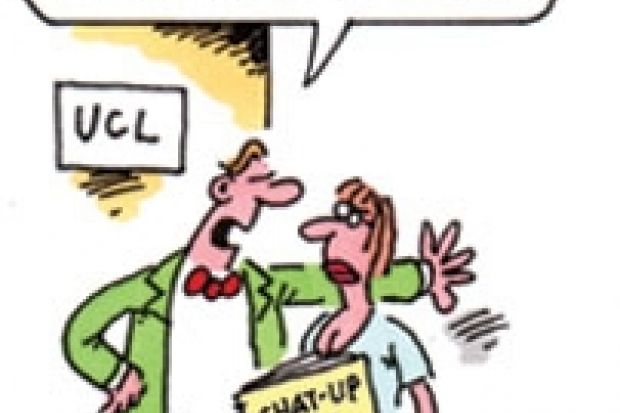One of the UK's most prestigious research-intensive universities has wealth on a par with a small liberal arts college in rural Missouri. This is one of the lessons from a league table of university endowment performance, which unsurprisingly put the universities of Cambridge and Oxford top in the UK. The Cambridge fund has assets that are worth about £1 billion, and this is distinct from the endowments of the university's individual colleges, which have investments worth about £3 billion. Edinburgh was a distant third in the UK, with assets valued at a measly £165 million. If Edinburgh were in North America, it would be the 190th richest institution - "one ahead of the College of the Ozarks", the Financial Times said on 16 September.
Scientists reacted with anger after the government portrayed them as "unhinged" in a campaign against legal highs, titled "Crazy Chemist". The campaign featured a picture of a bald, middle-aged man with a menacing expression, alongside the slogan: "The crazy chemist needs human lab rats." On 16 September, it was reported that Jim Iley, the Royal Society of Chemistry's director of science and education and a visiting professor at The Open University, said: "This is a lazy stereotype of the chemist as unhinged scientist."
Students at University College London will be experts at attracting the opposite sex if they pay heed to a lecturer behind some research with real potential impact. Petra Boynton, who graces the lecture theatres of UCL and the pages of More magazine, where she is an agony aunt, saw her discussion of chat-up lines at the British Science Festival covered by the national press on 17 September. Dr Boynton said there was "no science" behind well-worn lines such as: "Baby, you remind me of a parking ticket. You've got FINE written all over you." She advised against such silver-tongued talk and against time-consuming evaluations of body language across a crowded room. "All the while most people are just waiting for somebody to say 'hello'," Dr Boynton said.
The coalition government has come under fire from an academic for pursuing a "Groucho Marx" approach to teacher training, it was reported on 17 September. In January, David Cameron said he would end the system whereby "people with third-class degrees can get taxpayers' money to enter postgraduate teacher training". University of Buckingham researchers Alan Smithers and Pamela Robinson found that in 2008-09 the plans would have forced 430 trainee science teachers - 14 per cent of the total - to fund their own degrees. Professor Smithers said: "The government seems to be hoping that Groucho Marx was right and that by making entry more difficult, teaching will become more attractive."
A former theology professor has said the theories of his ex-colleagues in the sciences cannot explain the meaning of existence. Pope Benedict XVI, speaking at St Mary's University College in London on 17 September during his visit to the UK, conceded that the human and natural sciences provide us with an "invaluable understanding" of aspects of our existence. But he said the sciences "cannot satisfy the deepest longings of the human heart, they cannot fully explain to us our origin and our destiny, why and for what purpose we exist; nor indeed can they provide us with an exhaustive answer to the question 'Why is there something rather than nothing?'"
Universities have been urged to take a stand against academic ghostwriting. Ben Goldacre used his Bad Science column to highlight both the drug companies that employ a medical writing company to produce papers for publication in journals, and also the academics who are willing to put their names to the papers to give their CVs a boost. Dr Goldacre says in The Guardian on 18 September: "If the authors did not write or lead on (a paper), they should say so. Universities could take a lead, but do not, and so these problems will persist."
Register to continue
Why register?
- Registration is free and only takes a moment
- Once registered, you can read 3 articles a month
- Sign up for our newsletter
Subscribe
Or subscribe for unlimited access to:
- Unlimited access to news, views, insights & reviews
- Digital editions
- Digital access to THE’s university and college rankings analysis
Already registered or a current subscriber?
